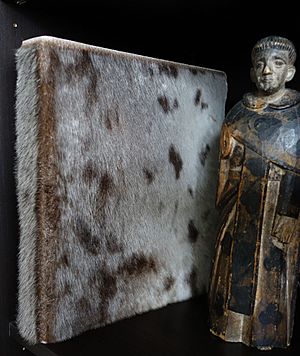Great Greenland Furhouse facts for kids
| Aktieselskab | |
| Industry | Fashion, Fur trade |
| Founded | 1985 |
| Founder | Hans Lassen |
| Headquarters | , |
|
Key people
|
Bruno Olesen (Chairman) Preben Møller (CEO) |
| Products | Haute couture, Ready to wear, Accessories, Footwear & Fur |
|
Number of employees
|
64 |
Great Greenland Furhouse is a company in the town of Qaqortoq, Greenland. It is known for processing seal skins to make clothing and fashion items. The company works closely with the Government of Greenland to support local hunters and the traditional seal skin trade.
Great Greenland buys seal skins from hunters all across the country. It has its own trading stations in big towns like Maniitsoq, Nuuk, and Tasiilaq. It also works with over 70 smaller trading posts in villages. Even in the most remote places, hunters can sell dried skins through the local Pilersuisoq store.
More than 2,500 people in Greenland are involved in the seal skin trade with the company. This makes Great Greenland a very important employer for the whole country.
Contents
Company History
The company started in 1977 as "Grønlandsgarveriet," which means "The tannery of Greenland." Its founder, Hans Lassen, specialized in tanning, which is the process of turning animal skins into leather or fur. In 1982, the government of Greenland took ownership of the company. The name was changed to Great Greenland in 1991.
For several years, the company faced financial difficulties. However, it began to do better financially in 2013. The company also took part in the Kopenhagen Fur auction in 2014, which is the largest fur auction in the world. There, it sold thousands of fur pieces.
The Seal Fur Trade
For many years, there have been debates about the seal fur trade. These discussions have led to rules that affect Great Greenland's business.
Rules in the United States and Europe
In the United States, a law called the Marine Mammal Protection Act of 1972 makes it illegal to bring in or sell products from any marine mammal, including seals. This rule applies no matter how many of the animals there are.
In 2009, the European Parliament also voted for a ban on seal products across the European Union. However, they made a special exception for the Inuit people of Greenland. This exception allows them to continue their traditional hunt and sell some seal products. Most of Great Greenland's products are sold in Europe, especially in Denmark.
Supporting Local Hunters
Because of these bans, Great Greenland receives money from the government each year. This money helps support the traditional Greenlandic seal hunt. There are about 1,900 licensed hunters in Greenland. For many of them, selling seal skins is an important part of how they make a living.
The 2009 ban from the EU had a big impact. Many hunters turned to fishing instead. This led to changes in the environment, as the seal population grew and ate more fish.
See also
 | Bayard Rustin |
 | Jeannette Carter |
 | Jeremiah A. Brown |


